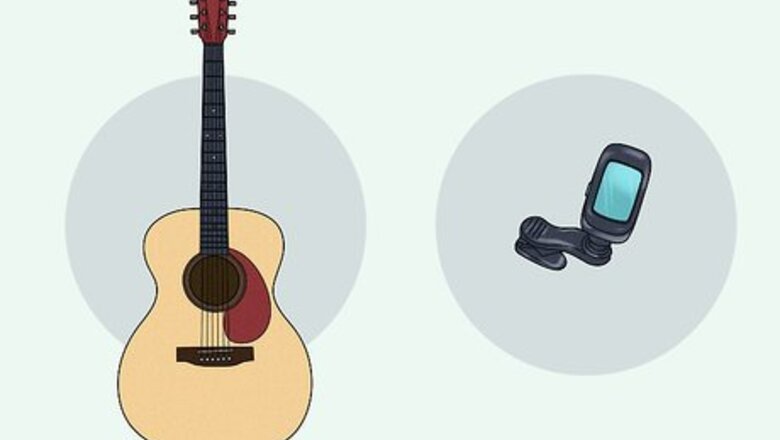
views
The Basics
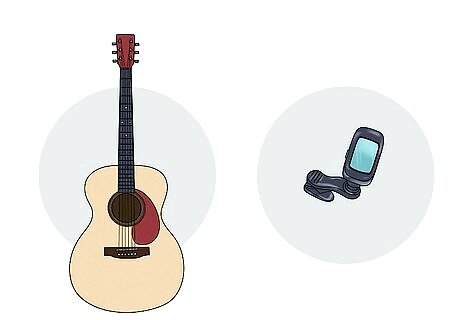
Get a basic guitar and a tuner. If you’re going to learn to play, then of course you’ll need a guitar! A simple beginner guitar is fine to start out with. Whether you play an acoustic or electric guitar, you’ll also need a pick and strap to get started. For an electric guitar, you’ll also need an amplifier and a cable to hook it up with. You should also get an electronic tuner or tuning fork so you can keep everything in the right pitch. If you’re just starting out, then it’s best to avoid spending a lot of money on a guitar. Go to a store and try out some economy models to see what’s comfortable and affordable for you.
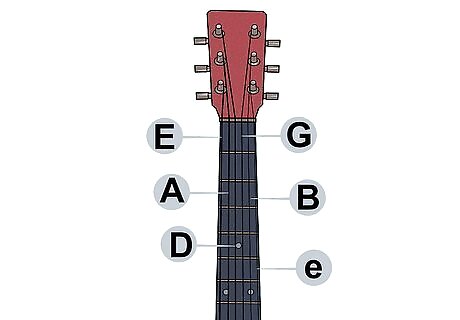
Learn the parts and strings of your guitar. Look up the strings, parts, and controls of your guitar to learn what everything does. This way, you can get the most out of your guitar. In standard tuning, the guitar strings are E, A, D, G, B, e, in order from thickest to thinnest. The second e is lowercase because the pitch is higher than the other E. Make sure you look up the parts of your specific guitar. For example, the controls on a Les Paul and Telecaster are different.
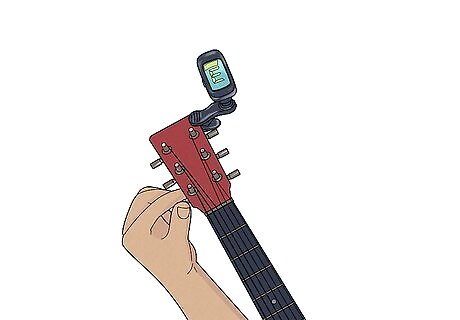
Tune your guitar so you're ready to play. You can find all the information you need about tuning your guitar online. Use either an electronic tuner or a tuning fork and adjust all 6 strings to the right pitch by tightening or loosening them. This way, everything you play will sound right. While standard tuning is E, A, D, G, B, E, there are also other tunings. However, when you're just starting out, you should keep your guitar in standard tuning to get the basics down. There are all kinds of instructional videos online about changing your strings, adjusting the tension, and doing other basic repairs. You can save a lot of money by watching some of these as well.
Notes and Chords
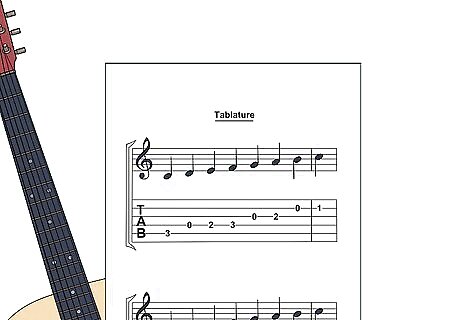
Teach yourself to read tablature. Tablature, or tabs, are basically a map of where to put your fingers on the guitar neck. Tabs show all 6 strings on the guitar and numbers on each string. The numbers represent which frets you put your finger on. Tabs are important for learning chords, scales, and songs, so learning how to read them early on will make practicing a lot easier later. For example, if a tab sheet shows A – 6, that means you put your finger on the 6th fret of the A string. Tabs are also much easier to read than sheet music, so you’ll save a lot of time by learning tabs first. Professionals often recommend that you learn to play by ear instead of relying on tabs. However, even if you don’t rely on them, knowing how to read tabs is very important for learning scales and techniques.
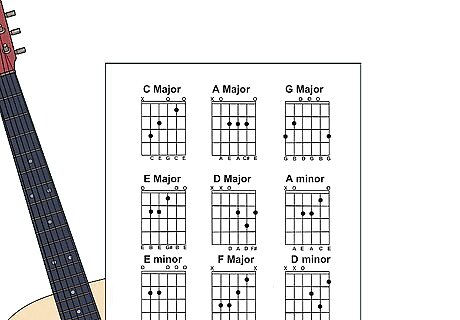
Start with the basic major and minor chords on guitar. Chords are the foundation of guitar playing, and you can play many famous songs by just learning the main ones. Once you can read tabs, learning chords is simple. Just look up some basic chord shapes and start strumming them. The main chords on guitar are A, A minor, B, B minor, C, D, D minor, E, E minor, F, and G. Tons of songs use only a few of these chords. Look up the shapes for these chords to get a good foundation for your playing. There are also power chords, which are 3 notes: a root, a fifth, and an octave. Power chords are common in rock, punk, and metal music.
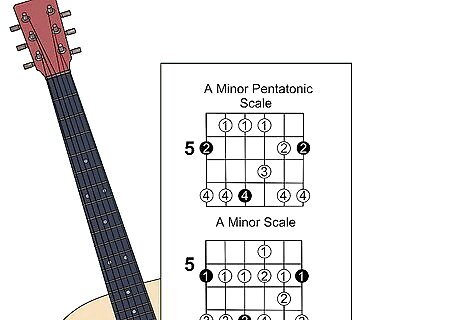
Practice scales to build your finger strength. A lot of new players find scales and music theory boring, but don’t skip it! A scale is a series of notes ordered according to their pitch. Different scales give a whole different flavor to your playing. Even learning a few scales gives you a huge musical vocabulary, and you’ll also build a lot of strength and dexterity in your hands by practicing them. The most basic scales are the major and minor. Learning the notes in these scales will give you a good foundation. Some more exotic scales include the pentatonic, aeolian, Phrygian, and Dorian. Learn these to give your playing a different twist.
Resources
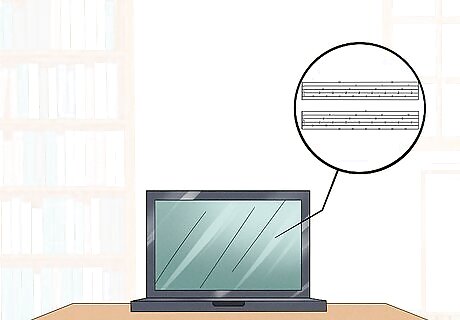
Get tabs from a good website. To learn songs and patterns correctly, you’ll need accurate tablature. Just doing a simple search for tabs should bring up lots of websites. Click through and find the ones that you like. Once you find a good source, then stick with it for all your tab needs. A search term could be “major scale tabs.” This will give you plenty of hits to learn from, and you can then just copy what you see. Some of the main sites for tabs are 911tabs.com and ultimate-guitar.com. Some teachers and musicians also upload tabs onto their personal websites, so you might find some good sources here too. Many tab websites have a rating system where users can rank how accurate the tab is. This is a good way to find quality sites. Remember to use tabs as a guide, but don’t rely on them completely. If the tab doesn’t sound right to you, trust your ear and play the way you think it sounds right.
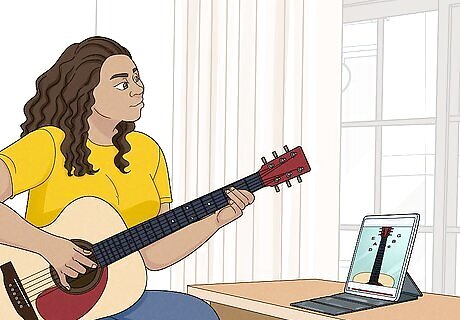
Watch YouTube videos for instruction on songs, scales, and techniques. YouTube is one of the best resources for learning to play guitar because you can see and hear what you’re supposed to do. There are some excellent guitar teachers who have designed lessons for beginner, intermediate, and expert players, so you’ll have plenty to watch and practice with. Do a quick search for beginner guitar lessons and get started. Some of the most popular guitar channels on YouTube are Andy Guitar, Music Is Win, and the Art of Guitar. Some professional musicians also have their own channels where they demonstrate how to play their music. Some YouTube channels have entire beginner courses for guitar players. Search something like “basic guitar lessons” or “guitar for beginners.” You can then follow each video to complete an entire course. If you’re looking for something particular, search for “how to play the minor scale.” You’ll find plenty of videos. There is also a lot of advanced stuff on YouTube that you aren’t ready for yet, so stick with basic courses to avoid getting overwhelmed.
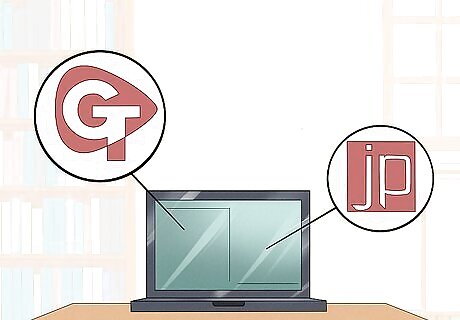
Sign up for a digital course. Besides free resources, there are also paid lessons available online from professional teachers. These lessons work very similarly to in-person lessons. The teacher will upload videos explaining the lessons, and you’ll follow along. Some might even do live lessons with a webcam so you can ask questions and get feedback. If you want more personal guidance, this might be the right choice for you. Online lessons can range in price from $20-100 per month. Before you actually pay for a course, you should still check YouTube or other websites that teach the same thing. You might be able to get the same instruction for free. Avoid courses that make unrealistic promises. These could be scams. For example, if a course promises to make you an expert within a week, this isn’t possible. Skip resources like these to avoid losing your money.
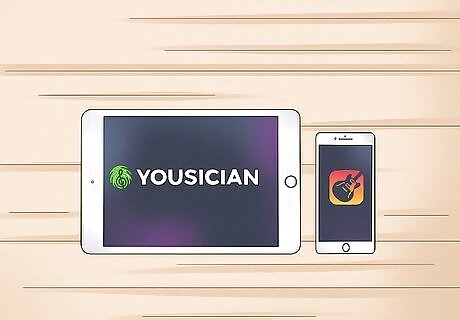
Download apps and games for interactive lessons. There are some apps that make learning guitar into a fun game, which is a great way to stay motivated. Check on the app store for guitar learning apps that you can use to make your practice sessions fun. Some apps are pretty basic and just give you chord and scale shapes. Others are full-on games that you can plug your guitar into. These are great tools to get through the more boring parts of practicing. Popular apps include Ultimate-Guitar, Songsterr, Fender Play, and Jam Play. Try some of these to find your favorite.
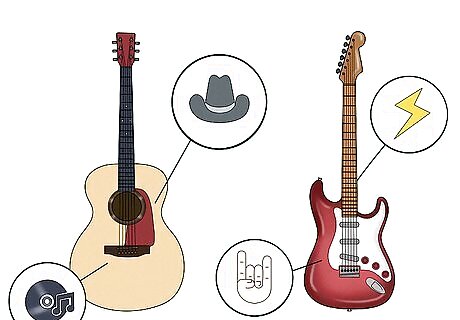
Use resources that cover the style of music you want to play. While there are guitar-playing basics that everyone should know, there are also important differences between diverse styles of music. You’ll be a lot more motivated if you use videos and resources that align with your own musical interests. For example, if you want to play in a heavy metal band, you probably don’t want a “Smooth Jazz 101” course. There is probably a lot of great information there, but it might not hold your interest.
Sticking with It
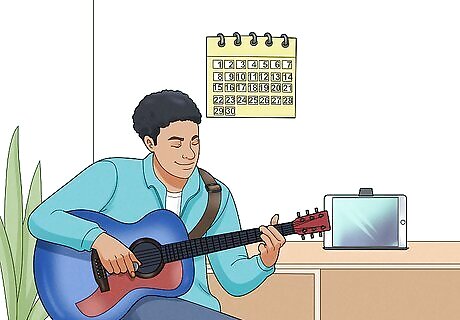
Practice a little bit every day. Reading and watching a lot of videos is a good thing, but it won’t make you a great guitar player by itself. No matter how you slice it, you have to practice to get better. Ideally, try to spend at least 30 minutes practicing each day. Run through some scales, chord shapes, or songs to build your skills. Even if you don’t have a lot of time, just strumming some chords for 5-10 minutes a day is much better than no practice at all. If you have trouble motivating yourself, pros recommend leaving your guitar in a visible spot instead of putting it away. That way, it’s easier to pick it up and start strumming.
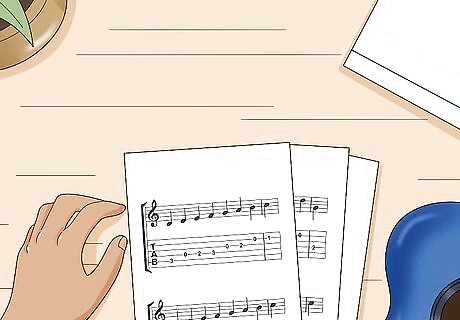
Use tab sheets to learn songs. You probably became a guitar player because you wanted to learn songs, so embrace that! There’s no better way to stay motivated than trying to learn some of your favorite songs. This makes your practice sessions a lot more fun, and you’ll feel accomplished when you nail a new song. Look up the tabs for songs that you like and try to copy those notes on your guitar. With some practice, you'll start to sound like your favorite band in no time. While looking up tabs for a song is a big help, you should also listen to it and try to figure it out. Learning by ear is a great skill that will make you a better player. Learning songs is a great way to learn new chords and techniques as well. A song you like might use a chord you’ve never seen before, so you’re learning new things while having fun.
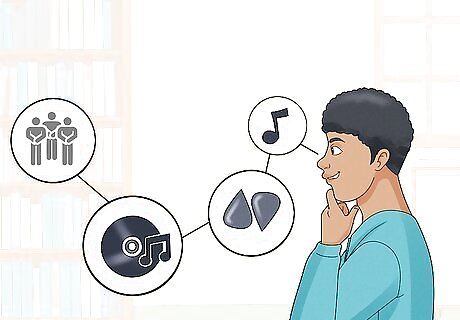
Set goals to keep yourself motivated. When you’re learning to play guitar online, you might notice that the lack of structure doesn’t keep you motivated. A good way to overcome this is by setting goals. They don’t have to be huge goals. Just saying “I want to learn the G major scale by next week” is a great one. No matter how small, these goals will keep you moving forward and improving. You can set all kinds of goals. Learning a new song, trying a new technique, or playing in a band are all good ways to stay motivated. Remember to keep your goals attainable. If you’re a beginner, then trying to play Jimi Hendrix songs might be a little tough right now.
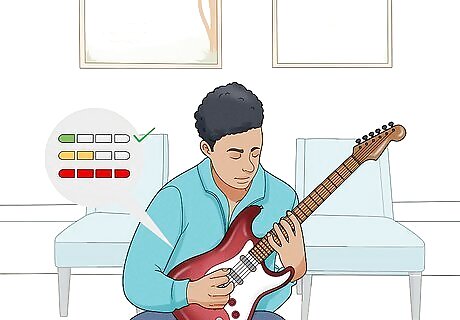
Use resources made for beginners so you don’t get frustrated. While it’s good to have ambitious goals, aiming too high can leave you frustrated. If you’re just starting out, don’t try to use intermediate or expert lessons. You’ll probably feel overwhelmed and might quit out of frustration. Avoid this by sticking with beginner lessons to build your skills slowly. That way, you’ll be all set to tackle the expert stuff later on.



















Comments
0 comment